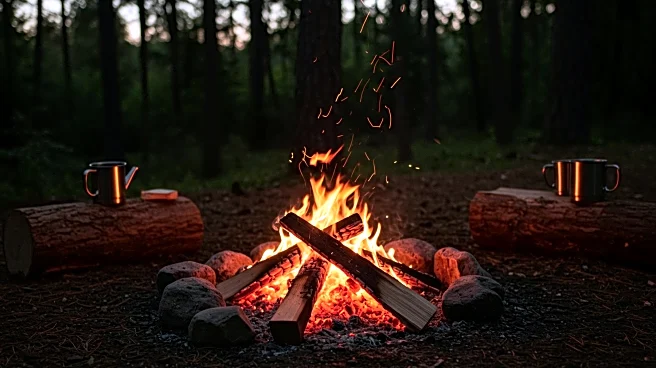What's Happening?
PlayerUnknown Productions has released a new survival game, Prologue: Go Wayback!, which emphasizes realistic survival mechanics, particularly in the crafting of campfires. Unlike traditional survival games where campfire creation is simplified, Prologue requires players to physically gather and arrange materials such as tinder, kindling, and firewood before igniting them with a ferro rod. This approach aims to enhance the sense of accomplishment and realism in survival gameplay. Players start in a cabin and must navigate a procedurally generated wilderness to reach a weather station, facing challenges such as cold, hunger, and environmental hazards.
Why It's Important?
The introduction of realistic survival mechanics in Prologue: Go Wayback! reflects a growing trend in the gaming industry towards immersive and authentic experiences. By requiring players to engage with the environment in a more hands-on manner, the game could set a new standard for survival games, influencing future game development. This shift may attract players seeking deeper engagement and challenge, potentially expanding the market for survival games. Additionally, it highlights the importance of innovation in game design, as developers strive to differentiate their products in a competitive industry.
What's Next?
As Prologue: Go Wayback! continues its open beta phase, PlayerUnknown Productions is expected to refine and expand its survival systems based on player feedback. The game is set for an early access launch later this year, which may include additional features and improvements. The success of this game could encourage other developers to explore similar realistic mechanics, potentially leading to a broader evolution in the survival game genre. Stakeholders such as game developers and publishers will likely monitor its reception closely to gauge consumer interest in more immersive gameplay experiences.
Beyond the Headlines
The realistic approach to survival mechanics in Prologue: Go Wayback! may also have implications for educational and training applications. By simulating real-world survival scenarios, the game could be used as a tool for teaching survival skills or for research into human behavior in extreme conditions. This could open new avenues for collaboration between the gaming industry and educational institutions, further expanding the role of video games in society.








